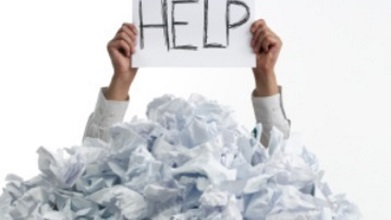 Look in any thesaurus, and the synonyms for overwhelm are pretty awful: overpower, subdue, oppress, quash, engulf, swallow, devastate, submerge, bury, suffocate.
Look in any thesaurus, and the synonyms for overwhelm are pretty awful: overpower, subdue, oppress, quash, engulf, swallow, devastate, submerge, bury, suffocate.
Ugh!
My friend Richard likes to refer to it as the state of “whelmed over.” Regardless how we refer to this state, my guess is that most of us have experienced the state of being overwhelmed. It is not a comfortable state. Whether the overwhelm is sudden or cumulative, chronic or acute, the feeling is one of drowning, immobility and powerlessness.
During those times, everything feels too big. It’s not just everyday busyness and packed schedules. When we’re overwhelmed, small things like paying bills, going to the store or making a meal become monumental tasks. Tasks that used to take only 10 or 15 minutes now seem utterly impossible. There seems to be no time for anything. So we do nothing.
Worse, we have no faith that ‘this, too, shall pass.’ We seem hopelessly mired in the quicksand of ‘too much.’ We keep trying to ‘will’ our way out of the quicksand with a will that just wants to lie down.
We live in a very overwhelming time — much more so than in decades past, says Jan Boddie, Ph.D., a California therapist who trains individuals and consults with businesses on the topic.
Things are speeding up. Technology’s well-touted time saving seems to have yielded less leisure time, not more. Companies are demanding more from us – hours and work load. Many adults are not only caring for their elderly parents, but still have children that have not fully ‘launched.’
“We have really lost connection, not just with nature, but with our own true human nature,” Boddie says. “We’re sidetracked. Our lives are in such fast forward that we don’t even recognize we might need help until we’re drowning.”
Part of the problem is the cultural belief system in place, one that overrates doing and achievement and underrates quality of being and experiencing connection and living out our values…if we know what those are.
In that cultural mindset, it’s not uncommon for a friend or a magazine article, with all good intention, to suggest the ‘Nike solution’: Just Do It. Make priorities. Choose three things and accomplish them quickly. Go through the mail as soon as it arrives. Do a ‘brain dump’ and create a huge to-do list with everything that you can think of on it. Now get started!
Not bad suggestions necessarily, but overcoming overwhelm isn’t really about measuring accomplishment. It’s about connecting with what has meaning for us, with what feeds and energizes us.
“Putting on a whole new sense of doing-ness is overwhelming,” Boddie says. “It creates a future-based state of mind that never ends because there will always be more to do. Being in relationship with what has meaning for us is fulfilling in the here and now. Feeling connected then connects us to the natural fuel for getting things done.”
When we come into alignment with our values and needs, we find the inner resources and spaciousness needed to get on with life. To find this requires the discipline of ‘stillness,’ to be still in multiple ‘moments’ in a state of ‘listening’ and coming to understand our ‘essence’ – why we are here, what is our purpose, who we wish to become.
First, however, we need to identify our individual symptoms and triggers for overwhelm. Our symptoms can be physical (e.g., nail biting, toe or finger tapping, migraines, neck ache); psychological (forgetful, rude, defensive); social (poor hygiene, little communication or connection with others, inadequate boundaries); or spiritual (loss of sense of purpose, unsure of what’s important).
Triggers are just as individual: a deadline, a certain tone of voice, change.
Noticing these symptoms and triggers is like setting off the two-minute warning buzzer: time for intervention techniques. And after we’ve come back to ourselves, it’s time for prevention techniques – taking care of our physical, intellectual, emotional, and spiritual energies. This includes things such as adequate rest, nutrition, exercise and, as always, connection to purpose.
“The focus that matters is in your heart,” Boddie says. “Connect with yourself and then that self can do the tasks.”
To a better you…
317-753-6017
jstruck@ldrshipvision.com
www.ldrshipvision.com
